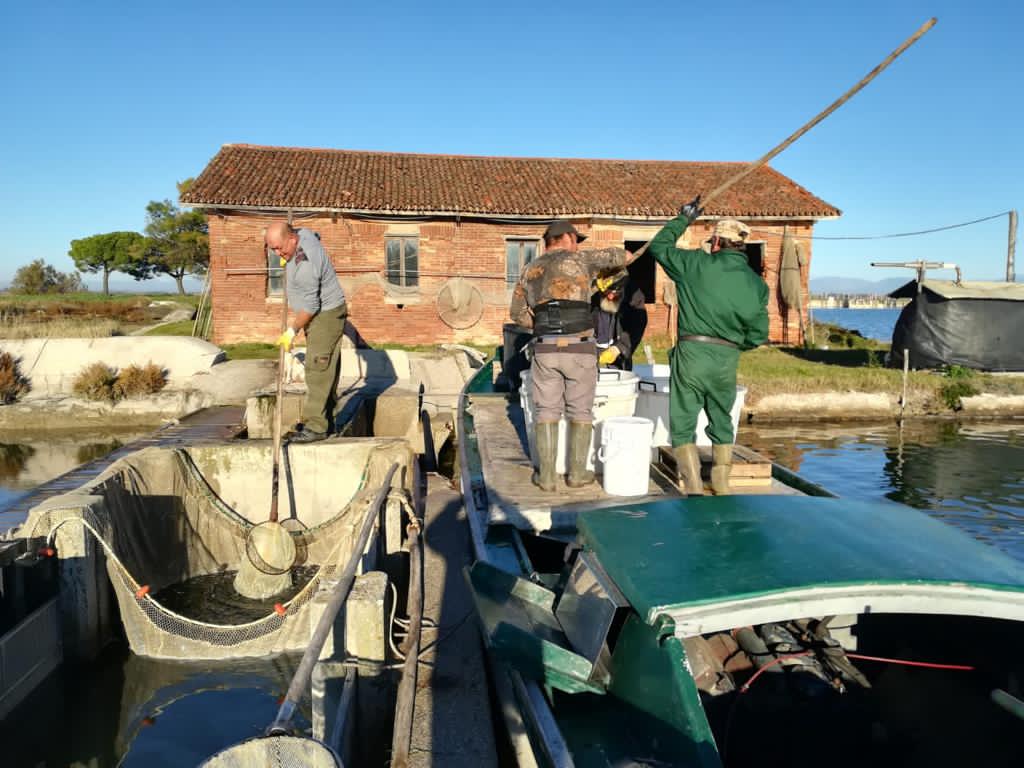Activities
The activities carried out by Blue Valley consists of two paths: fish farming and the production of carbon credits.
Both activities are extremely interconnected and cannot fundamentally exist without each other.
Through the extensive and respectful management of the natural cycles of fish farming, we can protect the valley.
Essentially, a microenvironment has been established that contrasts the effects of climate change and allows the marine ecosystems of the valley to capture and store copious amounts of CO 2 within its depths.

CCS in laguna
Carbon Capture Storage (CSS) is the process through which large quantities of carbon are captured and stored. In the Venice lagoon, this process is made possible due to two types of algae: macroalgae, which is visible to the naked eye, and phytoplankton. These subaquatic organisms capture CO2 through photosynthesis.
By the arrival of winter, these organisms die and deposit themselves in the muddy seabed, thus acting as a real storage system of carbon dioxide.
Due to their short life cycle, these organisms are among the most efficient in nature at absorbing and storing CO2.
This certified process in Blue Valley allows brackish water to capture large amounts of atmospheric CO2 in a definitive and natural way without any mechanical intervention.
The regular maintenance carried out in the valley guarantees the existence of this environment. Without it, even for just a few years, would permit the occurrence of clogging and anoxia that would lead to the loss of both environmental characteristics of suitability for fish farming as well as the loss of biodiversity that has been established due to the aquatic environment. Additionally, the effects of climate change already present in the seas would further threaten these ecosystems.
The activities of protecting the aquatic environment lead to an increase in biodiversity and a significant increase in the absorption of CO2 from the atmosphere.
The Blue Valley project aims to make the lagoon valleys a historic and unique ecosystem in the world at the forefront of the fight against climate change.
Certification
The carbon credits by Blue Valley benefit from the βNeutral certification issued by Bios srl, with the referenced practice UNI PDR 99:2021. The process of certification was followed by D&D Consulting (www.ded-consulting.eu).

Organic fishing
Extensive aquaculture (i.e. with a load of fish on the ecosystem no higher than the natural one and in any case without artificiality in nutrition and reproduction), supports the natural tendencies of the lagoon ecosystem by exploiting the natural laws that regulate the seasonal migrations of fish.
First Phase
Sowing, involves the introduction of wild fry made available by specialized fishermen authorized for this type of fishing. This procedure takes place in the so-called seragi (valley lakes) in which an attempt is made to maintain an optimal habitat by delivering, by means of streams of fresh or saltwater.
Subsequently, the fish are released into the valley where the active growth period begins.
Second Phase
During the summer, the fish feed in natural pastures where water exchange and oxygenation are guaranteed by circumferential and valley channels, designed and oriented in order to exploit the movement induced by the action of the wind.
Final Phase
From September to Christmas, the dismantling of fish is based on the instinctive return of the fish species to the sea. The fish swim through the Colauro (fishing channel) towards the Chiavica Maistra, which is equipped with mesh concrete (called lavorieri) to allow the passage of water and the capture of all the fish in transit to the sea. The subjects of size not yet suitable for sale are transferred, through special canalizations, to the wintering ponds. The ponds are mainly made up of deep channels, oriented perpendicularly to the direction of the prevailing winds and protected against the stirring action by thick hedges of tamarisk. Fish products that are not suitable for sale stop in the winter areas throughout the cold season to then be released again in the spring towards the pasture lakes.
Fish Species
The species regularly sown and bred in the Dogà Valley are sea bream, sea bass, all major varieties of mullet, eel and various fish.
Certification
The Blue Valley production fish has adhered to the organic certification (ITBIO005W017), the company has been assisted in this process by D&D Consulting (www.ded-consulting.eu).

